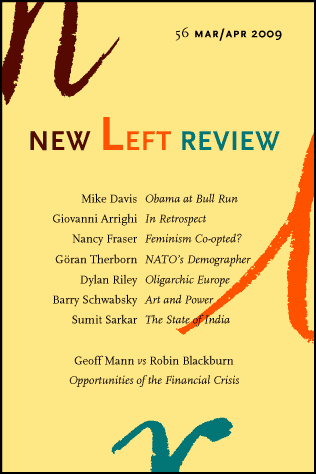Does Obama’s victory signal a political turning point comparable to 1980 or 1932? Mike Davis maps county-level changes, from below—minority-majority demographics, subprime suburbs, white-collar financial worries—catalysed by the 2008 campaign. From above, realignment of American capital behind the Silicon President.
Reviving its classical definition, ‘rule of the propertyless’, Luciano Canfora recasts the story of democracy in Europe as one of successive defeats, with lessons from Louis Napoleon on the use of suffrage as legitimation for oligarchic rule. Dylan Riley assesses a remarkable historical polemic from the Italian philologist.
The author of Long Twentieth Century and Adam Smith in Beijing, interviewed by David Harvey, on dispossession and development, capitalist crises, China’s future. The political education of a teenage factory-manager, via African liberation struggles and autonomia operaia; and influences—Braudel, Gramsci, Smith, Marx—in Arrighi’s work.
Do feminism and neoliberalism share a secret affinity? Nancy Fraser on the co-option of gender politics by the ‘new spirit’ of post-Fordist capitalism, and subordination of its radical critique to a World Bank agenda. Might a neo-Keynesian shift offer prospects for socialist-feminist renewal?
What political opportunities arise from the current financial crisis? In a critical response to Robin Blackburn’s essay in NLR 50, Geoff Mann proposes the insights of Marx’s theory of value as a starting point for thinking beyond capitalist social relations—as Blackburn’s measures, he argues, do not.
In answer, Blackburn explores the paradoxes of fictitious capital, underwritten by super-exploitation of China’s producers. A public-utility credit system, democratic forms of nationalization and mechanisms to socialize investment as steps towards financial dual power.
Göran Therborn on Heinsohn, Söhne und Weltmacht. Political demography of the Mid-East youth bulge as threat to Western power.
Sumit Sarkar on Guha, India after Gandhi. The subcontinental giant as ‘unnatural nation’ in the first history of the post-Independence era.
Barry Schwabsky on Groys, Art Power. Essays on aesthetics and politics, founded on the disconcerting insights of late-Soviet conceptualism.
